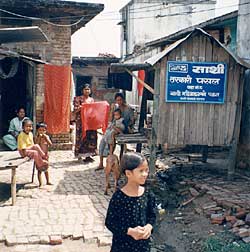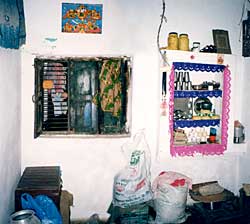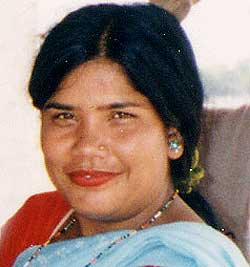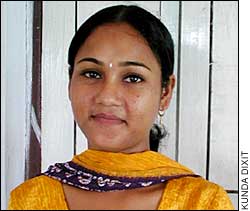 Sundari was angry enough to go to court even though she can't afford it. She carries photocopies of her case like a talisman. After 26 years of marriage her husband left her to remarry "someone of his own caste," she says scornfully. She wants justice, and the law to acknowledge a marriage her former husband denies. "Don't I deserve justice? Don't I have any rights?" she asks. "He ruined my life. I would have married someone else, or prostituted myself." Sundari (not her real name) will almost certainly lose the lawsuit, because she has neither the social clout nor witnesses who are willing to testify for her.
Sundari was angry enough to go to court even though she can't afford it. She carries photocopies of her case like a talisman. After 26 years of marriage her husband left her to remarry "someone of his own caste," she says scornfully. She wants justice, and the law to acknowledge a marriage her former husband denies. "Don't I deserve justice? Don't I have any rights?" she asks. "He ruined my life. I would have married someone else, or prostituted myself." Sundari (not her real name) will almost certainly lose the lawsuit, because she has neither the social clout nor witnesses who are willing to testify for her. For a Badi woman, this isn't an unusual trauma-the marriage to a higher-caste man that is hardly ever formalised, and the only other option that has been a constant for close to half a century, commercial sex work. In recent years, the social stigma has taken on scarier forms-entire Badi communities have been subject to coercive, discriminatory and often violent, "social improvement" measures by vigilante groups in mid-western Nepal.

The Badi people are a minority every way you look at it. They number around 60,000-0. 0027 percent of the Nepali population-and although the constitution bans untouchability and Nepal has ratified the Human Rights charter, the Badi community is considered the lowest untouchable caste by all of Prithvi Narayan Shah's "char jaat chattis barna" and must face all the usual caste restrictions, such as not being able to use the village well.
 The Badi came to western Nepal from north India in the late 18th century and relied on pottery, fishing and providing entertainment for their livelihood. Under the patronage of the hill kings of Sallyan, Jajarkot and Musikot, they evolved primarily into entertainers, and a few generations later, Badi women had become high-class courtesans. In the 1950s, Badi people lost their royal patrons, and mass entertainment eroded the value of skills such as dancing, singing and making madals. The women's sex work became a primary source of income, and they became less selective about their clientele.
The Badi came to western Nepal from north India in the late 18th century and relied on pottery, fishing and providing entertainment for their livelihood. Under the patronage of the hill kings of Sallyan, Jajarkot and Musikot, they evolved primarily into entertainers, and a few generations later, Badi women had become high-class courtesans. In the 1950s, Badi people lost their royal patrons, and mass entertainment eroded the value of skills such as dancing, singing and making madals. The women's sex work became a primary source of income, and they became less selective about their clientele. Social Awareness for Education (SAFE), an organisation that works for the legal and social empowerment of the Badi community, puts the number of commercial sex workers at around 400, though independent sources says the actual figure is close to 15 percent of the total Badi population. But regardless of the numbers, the perception of Badis as synonymous with prostitution means that they continue to be persecuted. They must work against severe apartheid-style discrimination socially, and the simple fact that to get official papers of any sort, their children need a father's name-Badi families we spoke with said that to get a citizenship certificate is often near impossible for them. They are slowly being forced to move out of urban areas and into the countryside, with fewer options for daily-wage work, and more chances of encounters with Maobadi.
Although prostitution is illegal in Nepal, Badi commercial sex workers sometimes have more to fear from their neighbours than even the police. In recent years, registered local bodies of 'moral police', usually called Tol Sudhar Samiti (Neighbourhood Improvement Committee), have gained notoriety among the Badi community. In urban areas they are mostly high caste men, while village committees have the occasional Badi member. The most visible effort of such bodies was a five-year campaign by the Drug Abuse and Prostitution Prevention Committee (Action Committee) in Gaganganj, a locality in urban Nepalganj. This group said they were working to expel prostitution-in their view, synonymous with the Badi community-from their neighbourhoods. They succeeded.
Harka Bahadur Gurung, chairman of ward 8 (Gaganganj) in Nepalganj, and its Action Committee, said to The Kathmandu Post in April 2001: "When we found men in Badi women's houses, we used to torture them as policemen would arrested thieves." As for the women, he said, only women activists 'tortured' the Badi sex workers. A year later in May 2002, Gurung was not as forthcoming when we asked him about the violence. "What is the truth?" he answered. "The truth is that our thinking that time was different. Everyone has the right to live but not in those circumstances so in the beginning we did play a negative role, but now we're doing our best for them."
 Manju, a Women Mobiliser for SAFE,remembers the terrifying night the Action Committee broke into her house and beat her up because she, a "whore-Badi", had complained about their activities. She took refuge in the local police station with a sympathetic inspector, and neighbours took her children in. When she returned home at dawn the next day, her house had been vandalised, and her television set smashed.
Manju, a Women Mobiliser for SAFE,remembers the terrifying night the Action Committee broke into her house and beat her up because she, a "whore-Badi", had complained about their activities. She took refuge in the local police station with a sympathetic inspector, and neighbours took her children in. When she returned home at dawn the next day, her house had been vandalised, and her television set smashed. Not one to be cowed down, Manju gathered a group of women and took a 16 hour bus-ride to Kathmandu to petition their case with Home Minister Khum Bahadur Khadka. She recalls, "He said he'd come to Gaganganj, solve our problems. Then he hired a bus for us and sent us back. Minister Khadka never came." Shortly afterwards Manju rented her house out to a Muslim family and moved to another neighbourhood. She does not plan to return to Gaganganj.
Gurung tells us proudly that there are no commercial sex workers in Gaganganj today. There are also barely any Badis. By the time the concerted segregation campaign had ended, almost all had fled, and the locality was renamed Pragatisheel Marg, Progress Road. Those who could, moved to the hills, but many were displaced to small hamlets along the highway where they continue to ply their trade.
The Badi are the target of reform for the Neighbourhood Improvement Committee in Ghorahi, Dang, as well. Thirty families live on the outskirts of town, many in mud houses built on government land. Most men work as day labourers, and the women earn a livelihood collecting grass. A few are commercial sex workers like 24-year-old Nirmala. This committee too has a simple take on crime and punishment, confiscating money as morality fines from clients and publicly humiliating the women. Its members are responsible for a network of scars on Nirmala's back, reminders of a whipping administered with stinging nettles. Unlike in Gaganganj, in Ghorahi the committee was unavailable for comment, and townspeople professed ignorance about its activities.
 Nirmala recalls the time a group of Badi women was summoned to the police station for a discussion. "There was no discussion," she said. "They intended to blacken our faces and parade us around town with placards saying 'I am a whore' around our necks." SAFE and the Badi Women's Samanwaya Committee managed to stop that, and Badi women from other districts converged on Ghorahi in December 2000 for a silent procession to protest the violence directed at them.
Nirmala recalls the time a group of Badi women was summoned to the police station for a discussion. "There was no discussion," she said. "They intended to blacken our faces and parade us around town with placards saying 'I am a whore' around our necks." SAFE and the Badi Women's Samanwaya Committee managed to stop that, and Badi women from other districts converged on Ghorahi in December 2000 for a silent procession to protest the violence directed at them. But despite all this, the community in Ghorahi is being forced to move outside town limits-and into Maobadi territory. Pareli (not her real name) lives in a small village an hour north of Ghorahi. She sneaks clients into her house when she can; when she can't, she meets them clandestinely in the fields. "You can't tell who is a Maobadi in disguise and who is a real customer, it's a risk I have to take," she told us. Discretion is necessary not only because of Maoist disapproval, but because the village has its own Neighbourhood Improvement Committee, which has been known to force clients who are caught to marry the woman, or hand both over to the police. The women cannot afford a police case, but marriage isn't a much better option either, because most of these 'husbands' leave sooner rather than later and, for the duration of their stay, either take the woman's earnings, or borrow against them. And many have already had experiences like Sundari's, when the 'husband' runs away, leaving them with children and debts, and often, STDs.
Pareli and other women in this village have learnt to take one precaution recently-insisting that their clients use condoms. SAFE initiated a peer educator system whereby the women in the community select one among their own number to be their spokesperson, and provide sex education and counselling. Shanti, the outspoken and articulate peer educator in Pareli's village, supplies free condoms. She continues to do her job though she has been threatened by Maoists, the committees and the police.
 But Shanti is afraid that her efforts will be in vain unless the marriages between Badi women and other men are not subject to the usual social norms. Many Badi women are married to men of higher castes, though these liaisons are rarely formalised, since for people living in the Hindu caste structure marriage to an untouchable is forbidden, and those who violate this 'rule' are in most cases ostracised and disinherited. Nar Bikram Thapa of ActionAid was part of the team who conducted an extensive study on the Badi in 2000. He said that many of these temporary husbands are men whose jobs transfer them to western Nepal. Once here, many marry Badi women, only to leave them when their tenure ends. "The prevailing logic runs along the lines that as prostitutes, Badis can't really have a husband or a real marriage. Therefore all 'marriages' are just temporary arrangements," he said. This is one reason that ActionAid encourages Badis to marry within their community, although such compulsions on one level echo the segregation and discrimination they are working against.
But Shanti is afraid that her efforts will be in vain unless the marriages between Badi women and other men are not subject to the usual social norms. Many Badi women are married to men of higher castes, though these liaisons are rarely formalised, since for people living in the Hindu caste structure marriage to an untouchable is forbidden, and those who violate this 'rule' are in most cases ostracised and disinherited. Nar Bikram Thapa of ActionAid was part of the team who conducted an extensive study on the Badi in 2000. He said that many of these temporary husbands are men whose jobs transfer them to western Nepal. Once here, many marry Badi women, only to leave them when their tenure ends. "The prevailing logic runs along the lines that as prostitutes, Badis can't really have a husband or a real marriage. Therefore all 'marriages' are just temporary arrangements," he said. This is one reason that ActionAid encourages Badis to marry within their community, although such compulsions on one level echo the segregation and discrimination they are working against. Through an alliance of NGOs and other community-based groups, Badis have found a platform to appeal for employment opportunities, skills-training and credit schemes, as well as quota system reservations, education, and-most importantly-citizenship for children born to women in the sex trade. Manju is cautiously optimistic, "If there are problems, there are solutions. Surely the government will realise that this is not solely about the Badi community. It's about Nepal. Perhaps in time our dignity will be restored to us and we'll be able to say 'I am a Badi' with pride."
Rupa is on her way
 Rupa is impatient with those who have stereotypes about her community. She herself has struggled all her life to break these stereotypes, overcome society's stigmatisation, and now has her eyes firmly set on her career in journalism. "We have to show ourselves that we can do anything, and I want to help my community overcome its problems by making us more aware and alert," says Rupa Shrestha, a sprightly 20-year-old now in college in Nepalganj.
Rupa is impatient with those who have stereotypes about her community. She herself has struggled all her life to break these stereotypes, overcome society's stigmatisation, and now has her eyes firmly set on her career in journalism. "We have to show ourselves that we can do anything, and I want to help my community overcome its problems by making us more aware and alert," says Rupa Shrestha, a sprightly 20-year-old now in college in Nepalganj. And what could be a more effective profession than journalism to do this. Rupa excelled in high school, and also took a media course to be able to communicate better. "I want to bring the message of equal opportunities for all Nepalis to the decisions-makers and politicians in Kathmandu," she told us. "I want to tell them about the real conditions of underprivileged Nepalis."
Rupa has herself lived with taunts and teasing all her life, and is convinced that this stems from ignorance among the general public about her community. "The only way to counter this is to change the public perception about us Badis," she says firmly. And Rupa also wants to reform the way media functions. "At the moment journalists are only interested in politics," she says. "There are so many social issues that need to be covered and brought to public notice. Life is not just politics."
But from the looks of it, Rupa's foray in journalism may be temporary. She shows the conviction of a firebrand politician.


